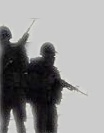 |






 AfricaSpeaks Weblog AfricaSpeaks Weblog
 Rootswomen Weblog Rootswomen Weblog
 Rootsie's Weblog Rootsie's Weblog
|
"The Red Sea catch: A Palestinian perspective"
Posted: Tuesday, April 30, 2002
By Dr. Mitri Raheb
On 4 January 2002 a news-breaking story was released with a great deal of noise and remarkable media coverage. An appealing story with an interesting title: The Karine A. The story released was that Israel captured a ship in the Red Sea loaded with 50 tons of weapons meant for the Palestinians. According to the Israeli official stand, the Palestinian Authority (PA), the Hezbollah and Iran are the parties who orchestrated the smuggling operation. Yet, and thanks to God, the U.S. high-tech intelligence and the Israeli naval elite's operational capability, the ship was caught in time and a disaster was prevented at the last minute.
Ariel Sharon, the Israeli prime minister, and Israel's Army Chief Mofaz were shown on television inspecting the weapons displayed on the docks of Eilat, looking happy with this special catch from the Red Sea. Sharon "surprisingly" accused President Arafat of wanting to blow up the peace process so 'dear' to the heart of Sharon. What a triumphant and breathtaking story!
Yet, once we dare to look behind the packaging of this story, we discover that there is something stinky there; there is something devious in how the 'facts' are presented and sold to the public. Therefore, taking the story, re-analyzing it, and seeing it in a new light will reveal some interesting aspects on our theme of "Impunity and the media."
At the time of its capture, the ship Karine A was in international waters of the Red Sea, some 300 miles away from Eilat and the Israeli borders. Commandos from Israel's Navy seals unit descended on the ship, while the 13 crewmembers were asleep. The ship and the crewmembers were "brought" to Eilat. The heroes, of course, are the Israeli commandos who grabbed the ship and its 50 tons of weaponry in what, under different circumstances, would be a blatant act of piracy. Piracy on the high seas used to be a hanging offence, but these days it's fine - as long as you say it's part of the war against terrorism.
Isn't it interesting that almost nobody was disturbed that a ship was hijacked in international waters and the entire crew was brought and detained without trial? Isn't it interesting how entire audiences, worldwide, can be so easily deceived and silenced?
The ship was loaded with 50 tones of rifles, rockets, missiles and ammunition. Initially, all of this weaponry sounds frightening. The reader is led to believe that we are talking here about a major catch. However, once we examine it closely, things look different. Fifty tons is roughly the weight of one Israeli tank, or half a dozen of those daisy-cutter bombs that the U.S. drops on Afghanistan. The Israeli arsenal includes everything up to (and including) nuclear weapons. Israeli tanks, rockets and helicopter gunships are in daily use against the Palestinians, so it would hardly be surprising if Palestinians wanted something a bit more effective than the homemade mortars they use at present. Nor do the Israelis have much room to complain: they became adept at smuggling weapons themselves during the British mandate of Palestine.
What the reader is not told is that Israel, the country that is complaining here, is one of the biggest producers, exporters as well as importers of weapons worldwide. It has a military budget of over US $12 billion a year. Yet, by packaging the story in this way, an image of the Palestinians as weapon smugglers is projected and emphasized, while no attention is paid to the many who are daily producing, marketing and profiting from weapon sales worldwide. Hence, Israel, one of the leading weapon dealers, is portrayed as the one banning the sale of weapons. People are misled to "strain at a gnat, and swallow a camel" (Matthew 23, 24).
According to the Israeli story, the weapons were found in 83 barrels, each 3.6 meters long by 1.2 meters wide, with dense air pockets at each end enabling them to float just beneath the surface of the sea. Their final destination is Gaza, so the story says. All this sounds very logical, unless one knows the security measures at the Israeli borders. How for heavens' sake should these huge barrels enter Gaza, a city under total Israeli siege, where Israel fully controls its air, land and sea? "It is easier for a camel to go through the eye of a needle," than 83 barrels this size through the Israeli borders, security fences and electronic detectives. As London's The Guardian wrote on January 21,
"Given the stringency of Israeli security measures, this is the part that many people find most unconvincing. Would the Palestinian Authority really be so stupid as to imagine that it could successfully import the weapons in this way? Assuming the ship had not been stopped in the Red sea and had passed through the Suez Canal without being caught by the Egyptians, the problem would be how to sneak its weapons into Gaza without the Israelis noticing. At current levels of surveillance, the chances of that happening are almost nil."
The story is told in a way for simple people to believe it. The idea here is not to question if the ship was carrying weapons or not. Our aim here is not to defend the use of arms by Palestinians but to reflect on the notion of impunity in relation to media. Why are certain countries, like Israel for example, immune to criticism? It acts as if it is above the international law. It is allowed, and it allows itself, to behave in way that could at least be described as arrogant. Its aggression is seldom condemned, questioned or critiqued.
On the contrary, often its aggression is packaged as self-defense. Its security is over every body else's security. The lives of its citizens are worth a thousand times the lives of others. It is as if Israel has a special status, and can allow itself to be above the law. The international community accepts the self-given role that Israel has assigned for itself, sometimes by hook and many times by crook.
Coming back to the Karine A: Only very few journalists tried to place this ship affair in its political context. The business of weapon sales, dealings and smuggling is one of the most thriving in the world, so why here? Why now?
The timing of the "capture" of the Karine A was significant. That same week, and after three weeks of "relative calm," U.S. General Anthony Zinni was coming back to the region, hoping to resume the political process and to work on the implementation of the Michel Report and Tenet Plan. Since Sharon does not have a political agenda, the ship came for him at a perfect time to underline his perception of Arafat as "terrorist," and to escape setting any political agenda. The Karine A was a convincing reason to concentrate on the military agenda. For Sharon the ship was the answer to a prayer.
However, the packaging of the story was intended for another long-term goal. The columnist of The Jerusalem Report (http://www.jrep.com), Ehud Ya’ari, voiced this on 28 January 2002. According to Ya’ari:
"For one thing, post-Karine A, it is unimaginable that any Israeli government — except a far-left one led, say, by Yossi Beilin — would agree to grant the Palestinians a state that has exclusive control over its borders with Jordan and Egypt. It was always stupid to assume that Israel might take such a risk. It would be even more stupid to think that Israel could take such a risk from here on. The borders will need to be under much tighter supervision than Ehud Barak had suggested at Camp David in the summer of 2000, where he proposed joint Israeli-Palestinian patrols along the border and joint supervision of the border crossings. This essentially means that in one way or another, the future Palestinian state will remain a combination of two semi-enclaves 'wrapped' by Israel, with strict control of shipping off Gaza’s coast as well."
This Israeli journalist reveals here the real political agenda behind this packaging of the Karine A, namely to prepare the public to accept an apartheid system in the Holy Land, with an Israeli state controlling the land, sea as well as the air-borders and two or three Palestinian "Bantustans" similar to the holes in Swiss cheese. Blowing this incident out of proportion, the ground is prepared so that when needed, an apartheid system will make sense, will face no strong opposition and will sound reasonable. Then, Israel can get away with an apartheid system. The memory of the public is thus poisoned enough with the Karine A affair so as not to oppose this apartheid system planned and committed against the Palestinian people.
The Israeli occupation of Palestine is the longest occupation in modern history. With the collapse of the peace process and the continuation of the Israeli colonial-settlement policy there is a real danger that the Israelis will be creating the only apartheid system of the 21st century. The dreadful part is that they might get away with it for two reasons. One, because Israel is dealt with internationally as a "state above international law," and two, because it masters the game of how to utilize the media, namely when and how to get a story quickly in such a way that serves its interests. In such a case, the media play into the hands of the powerful.
But the media are a two-edged sword. We cannot leave them in the hands of the powerful. We have to take hold of the media and learn how to use them to unravel the victor’s story. The real challenge for the future is how to help the powerless to be transformed from objects and spectators into actors. Thus, utilizing the media, setting the tone, telling authentic stories and presenting his/her own case.
[Mitri Raheb (PhD) was born in Bethlehem in 1962. From 1980-1987 he studied theology in Germany, graduating from the University of Marburg with a doctoral degree in theology. Since 1988, he has been serving as the Pastor of the Evangelical Lutheran Christmas Church in Bethlehem. He has been active in developing a contextual Christian theology in the Arab-Palestinian context as well as in the interfaith dialogue. and has published widely in the areas of interreligious dialogue, church history, and biblical interpretation. Dr. Raheb is the founder and general director of the International Center of Bethlehem, a training, a conference and a cultural center. Among his publications are "I am a Palestinian Christian." This article first appeared at the World Association for Christian Communication (WACC). You can access this website by going to the following URL: http://www.wacc.org.uk.
Dr. Mitri Raheb encourages your comments: mraheb@annadwa.org
YellowTimes.org
 Printer friendly version Printer friendly version
 Send page by E-Mail Send page by E-Mail
|








